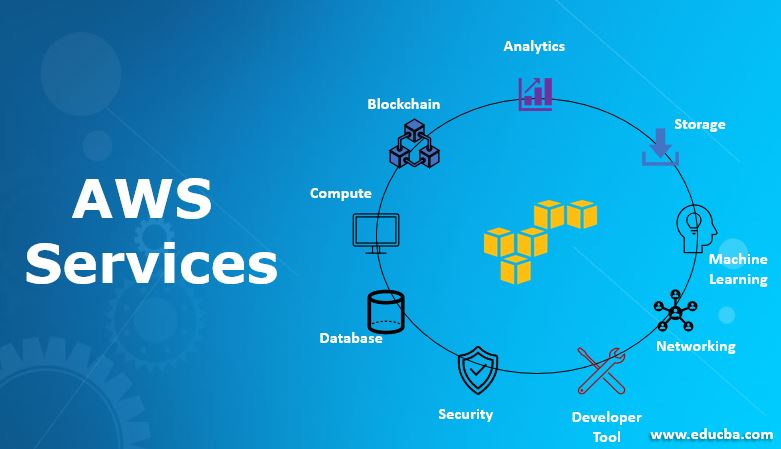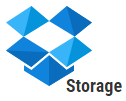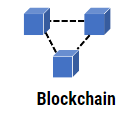Updated June 8, 2023
Introduction to AWS Services
The following article provides an outline for AWS Services. Amazon web service is an on-demand cloud computing platform that offers flexible, reliable, scalable, managed and easy-to-use, cost-effective cloud computing solutions; these all services come with a different level of abstraction like (IaaS) Infrastructure as a Service (PaaS) Platform as a Service, and (SaaS) packaged software as a service and all of the service can be used on a basic pay-as-you-go means you will only be paying for what you are using and while it’s using computing resources.
It is easy to scale as per need. Servers are distributed worldwide; hence, they are readily available, and data stored in these servers is easily retrievable. Moreover, it is secure and reliable. Nowadays, it is widely used and preferred as a cloud service provider. It provides over 100 services, including computing, storage, management tools, analytics, deployment, IOT, and more. All these services are provided under the Amazon portal per the user’s subscription. Most of these services are accessed as HTTP calls using the SOAP protocol.
List of Services Offered by AWS
Given below is the list of services offered by AWS:
- Analytics
- Storage
- Compute
- Blockchain
- Database
- Developer Tool
- Networking and Content Delivery
- Security, Identity, and Compliance
- Machine Learning
1. Analytics
Analytics has been a primary source of growth for businesses. Data is always valued as it gives valuable information. Customers need a fast and scalable system to handle significant data and provide valuable insights. It offers a variety of applications for this purpose. Amazon EMR provides the Hadoop framework to process big data. Amazon Kinesis helps in analyzing real-time streaming data. AWS Data Pipeline and Glue provide pipeline structures to schedule data load and processing. AWS offers many more applications for almost every operation.
 2. Storage
2. Storage
The data need to be stored somewhere to process it. It offers storage in three categories: object, block, and file. Amazon Simple Storage Service (S3) provides scalable data storage with backup and replication. Amazon Glacier offers storage for archived data and affordable retrieval. AWS backup service manages the backup of data. It automates the backup process. Apart from these applications AWS storage offers other services also.
3. Compute
Compute service is necessary for running any organization. The computer is required to host a complete web app to execute a function in a serverless environment. It offers a comprehensive portfolio of computing services like Amazon Elastic Compute Cloud (EC2) provides virtual servers or instances for computing. It is auto-scalable as per the requirement. Amazon Elastic Container Service is a high-performance container service that supports Docker containers. AWS Lambda offers serverless computing to run applications. Lightsail is an easy-to-use service that provides virtual servers, storage, DNS management, etc. It provides all the services required for the development of applications.
4. Blockchain
Blockchain is a new technology that helps customers work with multiple parties to maintain a verified transaction record. Amazon Managed Blockchain creates and manages a blockchain network. In addition, Amazon Quantum Ledger Database (QLDB) offers a fully managed ledger database to maintain transactions.
 5. Database
5. Database
A database can be used to store structured data. It provides various database services to support relational and non-relational databases. In addition, it offers a service to handle all application-specific use cases. Amazon Relational Database Service provides a fully managed database service that includes Oracle, SQL, MySQL, etc. High-performance, fully managed relational database services are provided by Amazon Aurora. Amazon Timestream provides a fully managed time-series database. Amazon DynamoDB provides database services for the NoSQL database. Along with these databases, AWS offers many other database services to support almost every type of requirement.
6. Developer Tool
Developer tools help a developer deliver software quickly and safely. DevOps can automatically build, test and deploy the application in different environments. It also helps in maintaining source code and version control. AWS Codestar allows users to set up a continuous delivery pipeline in minutes. AWS X-Ray helps to debug production applications. With the help of an X-Ray, the user can analyze and identify performance issues and application components. AWS CodeCommit provides fully managed private GIT repositories to store code and manage versions. Apart from these services, AWS provides AWS CodePipeline, AWS CodeBuild, AWS CodeDeploy, and AWS CLoud9 to support development and deployment.
 7. Networking and Content Delivery
7. Networking and Content Delivery
AWS is a virtual private cloud; it offers services over a network. Hence it ensures that AWS can run any workload over the network with security, performance, manageability, and availability. It provides a set of resources over the network by connecting it privately. It gives administrative control to users over a virtual network. This application offers load-balancing capabilities in networks. It also provides DNS to route end users to the application.
 8. Security, Identity, and Compliance
8. Security, Identity, and Compliance
While offering services over internet security is the utmost priority. With AWS Identity and access management, users can control user access and manage encryption keys. AWS Firewall Manager helps manage firewall rules for applications. Amazon Inspector is an automated security scan that helps improve applications’ security and compliance. Amazon Macie leverages machine learning to identify, classify, and protect sensitive data. Besides these security check services, AWS provides many more applications to keep the hosted applications secure and safe.
9. Machine Learning
Learning from existing data is called machine learning or artificial intelligence. AWS offers a wide range of services and pre-defined models for AI. Amazon SageMaker provides services to quickly build, train and deploy models at a big scale. It also supports custom model building. Users utilize Amazon Rekognition to analyze images and videos. Along with these, AWS offers ML services for speech recognition, language translation, chatbots, and many other scenarios, with high speed and scalability.
Conclusion – AWS Services
Apart from the services mentioned above, AWS offers services for Gaming Technology, IOT, Business Applications, Management and Governance, AR and VR, Media Services, Mobile, Robotics, etc. AWS provides all these services with full security. Therefore, even though the system is highly scalable and fast, it secures data, and the user maintains full control over access management. Moreover, it is cost-efficient and smart, which lets the user focus on what matters the most, i.e., Business and Customer. Apart from all these, AWS is trying to offer more and more services, and development is continuously going to support and improve the services.
Recommended Articles
This has been a guide to AWS Services. Here we discussed the basic concepts and a list of the top 9 services offered by AWS (Amazon Web Services). You can also go through our other suggested articles to learn more –


 2. Storage
2. Storage

 5. Database
5. Database
 7. Networking and Content Delivery
7. Networking and Content Delivery 8. Security, Identity, and Compliance
8. Security, Identity, and Compliance

